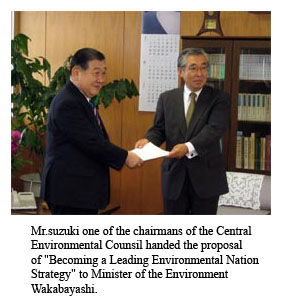Japanese Cabinet Approves Strategy For an Environmental Nation in the 21st Century
 On June 1, 2007, the Japanese government made a cabinet decision approving the country’s strategy titled “Becoming a Leading Environmental Nation Strategy in the 21st Century -Japan’s strategy for a Sustainable Society.” In a policy address in January 2007, then-Prime Minister Shinzo Abe announced a plan to formulate before June the strategy as a guide for clarifying the direction of environmental policies, which require both domestic and international engagement, and for contributing to the creation of the future global framework. A special committee of the Central Environment Council, an advisory body to the Cabinet, was established for discussion, and it provided input to the Environmental Minister for the Strategy.
On June 1, 2007, the Japanese government made a cabinet decision approving the country’s strategy titled “Becoming a Leading Environmental Nation Strategy in the 21st Century -Japan’s strategy for a Sustainable Society.” In a policy address in January 2007, then-Prime Minister Shinzo Abe announced a plan to formulate before June the strategy as a guide for clarifying the direction of environmental policies, which require both domestic and international engagement, and for contributing to the creation of the future global framework. A special committee of the Central Environment Council, an advisory body to the Cabinet, was established for discussion, and it provided input to the Environmental Minister for the Strategy.As a strategic effort to turn Japan into a Leading Environmental Nation, Japanese strengths–like accumulated wisdom and traditions of living in harmony with nature, environmental and energy technologies, and the experience of tackling industrial pollution–will be utilized as a driving force for environment-based economic growth and stimulation of local communities. This approach is expected to create a Japanese model for sustainable society and contribute to the development and prosperity of Asia and the world.
Eight strategies are to be given top priority over the next year or two: international leadership in tackling climate change; conservation of biological diversity to preserve natural assets for today and the future; sustainable recycling of resources through the 3Rs (reduce, reuse, recycle); international cooperation based on experiences and lessons gained from having dealt with industrial pollution; economic development based on environmental and energy technologies; local community development that makes the most of natural assets; human capacity building that makes people sense, think about, and act for the environment; and development of frameworks that help make Japan an environmental nation.
Junko Edahiro, co-representative of Japan for Sustainability, joined the discussion as a member of the special committee. Her message to the committee was that it is necessary to have a large vision and roadmap to create a true national strategy, and that it is important not only to raise public awareness and promote technological development, but also to establish socio-economic systems that motivate people to take action.
To learn more about this information please visit, Ministry of the Environment Government of Japan
You can return to the main Market News page, or press the Back button on your browser.

